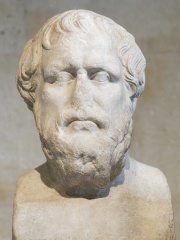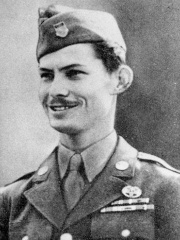
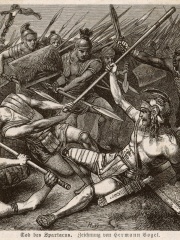
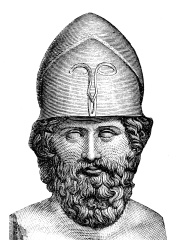
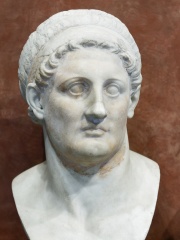
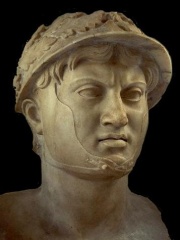
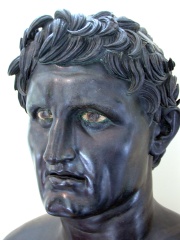

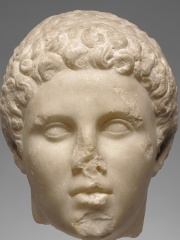
The Most Famous
MILITARY PERSONNELS from Greece
This page contains a list of the greatest Greek Military Personnels. The pantheon dataset contains 2,058 Military Personnels, 56 of which were born in Greece. This makes Greece the birth place of the 10th most number of Military Personnels behind China, and Ukraine.
Top 10
The following people are considered by Pantheon to be the top 10 most legendary Greek Military Personnels of all time. This list of famous Greek Military Personnels is sorted by HPI (Historical Popularity Index), a metric that aggregates information on a biography's online popularity. Visit the rankings page to view the entire list of Greek Military Personnels.

1. Alexander the Great (356 BC - 323 BC)
With an HPI of 95.63, Alexander the Great is the most famous Greek Military Personnel. His biography has been translated into 213 different languages on wikipedia.
Alexander III of Macedon (Ancient Greek: Ἀλέξανδρος, romanized: Aléxandros; 20/21 July 356 BC – 10/11 June 323 BC), most commonly known as Alexander the Great, was king of the ancient Greek kingdom of Macedon. He succeeded his father Philip II to the throne in 336 BC at the age of 20, and spent most of his regency conducting a lengthy military campaign throughout parts of Asia and Egypt. By the age of 30, he had created one of the largest empires in history, stretching from Greece to northwestern India. He was undefeated in battle and is widely considered to be one of history's greatest and most successful military commanders. Alexander was tutored by Aristotle until the age of 16. In 335 BC, shortly after assuming the throne of Macedon, he launched a campaign in the Balkans and reasserted control over Thrace and parts of Illyria before marching on the city of Thebes, which was subsequently destroyed in battle. Alexander then assumed leadership of the League of Corinth, created by his father, and with his authority over all Greeks he launched a pan-Hellenic campaign to invade the Achaemenid Persian Empire. He launched the invasion in 334 BC, and with it began a series of campaigns which lasted for 10 years. Following his conquest of Asia Minor and a series of decisive battles, particularly at Issus and Gaugamela, the power of the Achaemenid Empire was broken. He subsequently overthrew Darius III and conquered the Achaemenid Empire in its entirety. After the fall of Persia, the Macedonian Empire held a vast swath of territory between the Adriatic Sea and the Indus River. Alexander endeavored to reach the "ends of the world and the Great Outer Sea" and invaded India in 326 BC, achieving an important victory over Porus, an ancient Indian king of present-day Punjab, at the Battle of the Hydaspes. He was eventually forced to turn back at the Beas River, after facing mutiny from troops, and later died in 323 BC in Babylon, Mesopotamia, in the city which he had planned to make the capital of his empire, while on his return to Greece. Alexander's death put an end to his planned invasion of Arabia. In the years following his death, a series of civil wars broke out across the Macedonian Empire, eventually leading to its disintegration at the hands of the Diadochi. Alexander's death marks the conventional beginning of the Hellenistic period. Through his conquests, he built a legacy that includes the cultural diffusion and syncretism, which gave rise to Greco-Buddhism and Hellenistic Judaism. He founded more than twenty cities, with the most prominent being the city of Alexandria in Egypt. Alexander's establishment of Greek colonies and the spreading of Greek culture led to Hellenistic civilization becoming a major force in the ancient world, influencing regions as far east as the Indian subcontinent. The Hellenistic period developed through the Roman Empire into modern Western culture; the Greek language became the lingua franca of the region and was the predominant language of the Byzantine Empire until its collapse in 1453 AD. Alexander became a legendary hero similar to Achilles, featuring prominently in the historical and mythical traditions of both Greek and non-Greek cultures. His military achievements and successes in battle made him the touchstone against which many later military leaders would judge themselves. His tactics remain a significant subject of study in military academies worldwide. Legends of Alexander's exploits were coalesced into the 3rd century Alexander Romance which, in the premodern period, went through over one hundred recensions, translations, and derivations and was translated into almost every European vernacular and every language of the Islamic world. After the Bible, it was the most popular form of European literature.

2. Spartacus (109 BC - 71 BC)
With an HPI of 82.09, Spartacus is the 2nd most famous Greek Military Personnel. His biography has been translated into 85 different languages.
Spartacus (; c. 103–71 BC) was a Thracian gladiator (Thraex) who was one of the escaped slave leaders in the Third Servile War, a major slave uprising against the Roman Republic. Historical accounts of his life come primarily from Plutarch and Appian, who wrote more than a century after his death. Plutarch's Life of Crassus and Appian's Civil Wars provide the most detailed accounts of the slave revolt. Although Spartacus is a significant figure in Roman history, no contemporary sources exist, and all accounts are written significantly later, by persons not directly involved, and without perspectives of slaves or eyewitnesses. Little is known about him beyond the events of the war, and the extant accounts are contradictory. All sources agree, however, that he was a former gladiator and accomplished military leader. Spartacus is described as a Thracian by birth, possibly from the Maedi tribe. Before his enslavement and use as a gladiator, he served as a soldier with the Romans. His revolt began in 73 BC when, along with about 70 other gladiators, he escaped a gladiatorial school near Capua. Despite their initially small numbers, Spartacus's forces were able to defeat several Roman military units and swell their ranks to an estimated 70,000 enslaved people and others. Spartacus proved himself a capable tactician despite the dearth of formal military training among his followers, who were a diverse mix. The rebellion posed a significant challenge to Roman authority, prompting a series of military campaigns against it. Ultimately, Marcus Licinius Crassus was tasked with suppressing the revolt. Despite initial successes and attempts to negotiate and escape to Sicily, Spartacus's forces were defeated in 71 BC. Spartacus was presumed killed in the final battle, although his body was never found. In the aftermath of the rebellion, 6,000 captured rebels were crucified along the Appian Way. Spartacus's motives remain a subject of debate. Some sources suggest he aimed to escape Italy, while others hint at broader social reform goals. His legacy has endured, inspiring cultural works and becoming a symbol of resistance and revolutionary movements, influencing such figures as Karl Marx and Toussaint Louverture. The rebellion, interpreted as an example of oppressed people fighting for their freedom against a slave-owning oligarchy, has been portrayed in literature, television, and film. The philosopher Voltaire described the Third Servile War as "the only just war in history". Although this interpretation is not specifically contradicted by classical historians, no historical account claims that the goal was to end slavery in the Republic.

3. Themistocles (524 BC - 459 BC)
With an HPI of 80.86, Themistocles is the 3rd most famous Greek Military Personnel. His biography has been translated into 69 different languages.
Themistocles (; Ancient Greek: Θεμιστοκλῆς, Themistoklēs; c. 524 – c. 459 BC) was an Athenian politician and general. He was one of a new breed of non-aristocratic politicians who rose to prominence in the early years of the Athenian democracy. As a politician, Themistocles was a populist, having the support of lower-class Athenians, and generally being at odds with the Athenian nobility. Elected archon in 493 BC, he convinced the polis to increase the naval power of Athens, a recurring theme in his political career. During the first Persian invasion of Greece, he fought at the Battle of Marathon (490 BC), and may have been one of the ten Athenian strategoi (generals) in that battle. In the years after Marathon, and in the run-up to the second Persian invasion of 480–479 BC, Themistocles became the most prominent politician in Athens. He continued to advocate for a strong Athenian navy, and in 483 BC he persuaded the Athenians to build a fleet of 200 triremes; these proved crucial in the forthcoming conflict with Persia. During the second invasion, he commanded the Athenian navy at the battles of Artemisium and Salamis in 480 BC. Due to his subterfuge, the Allies successfully lured the Persian fleet into the Straits of Salamis, and the decisive Greek victory there was the turning point of the war. The invasion was conclusively repulsed the following year after the Persian defeat at the land battle of Plataea. After the conflict ended, Themistocles continued his pre-eminence among Athenian politicians. However, he aroused the hostility of Sparta by ordering the re-fortification of Athens, and his perceived arrogance began to alienate him from the Athenians. In 472 or 471 BC, he was ostracised, and went into exile in Argos. The Spartans now saw an opportunity to destroy Themistocles, and implicated him in the alleged treasonous plot of 478 BC of their own general Pausanias. Themistocles thus fled from southern Greece. Alexander I of Macedon (r. 498–454 BC) temporarily gave him sanctuary at Pydna before he traveled to Asia Minor, where he entered the service of the Persian king Artaxerxes I (reigned 465–424 BC). He was made governor of Magnesia, and lived there for the rest of his life. Themistocles died in 459 BC, probably of natural causes. His reputation was posthumously rehabilitated, and he was re-established as a hero of the Athenian, and indeed Greek, cause. Themistocles can still reasonably be thought of as "the man most instrumental in achieving the salvation of Greece" from the Persian threat, as Plutarch describes him. His naval policies would have a lasting impact on Athens as well, since maritime power became the cornerstone of the Athenian Empire and golden age. Thucydides assessed Themistocles as "a man who exhibited the most indubitable signs of genius; indeed, in this particular he has a claim on our admiration quite extraordinary and unparalleled".

4. Ptolemy I Soter (367 BC - 283 BC)
With an HPI of 80.86, Ptolemy I Soter is the 4th most famous Greek Military Personnel. His biography has been translated into 77 different languages.
Ptolemy I Soter (; Greek: Πτολεμαῖος Σωτήρ, Ptolemaîos Sōtḗr, "Ptolemy the Savior"; c. 369/68 BC – January 282 BC) was a Macedonian Greek general, historian, and successor of Alexander the Great who went on to found the Ptolemaic Kingdom centered on Egypt. Ptolemy was king and pharaoh of Ptolemaic Egypt from 305/304 BC to his death in 282 BC, and his descendants continued to rule Egypt until 30 BC. During their rule, Egypt became a thriving bastion of Hellenistic civilization and Alexandria a great seat of Greek culture. Ptolemy I was the son of Arsinoe of Macedon by her husband Lagus. Ptolemy was one of Alexander's most trusted companions and military officers. After the death of Alexander in 323 BC, Ptolemy retrieved his body as it was en route to be buried in Macedon, placing it in Memphis instead, where it was later moved to Alexandria in a new tomb. Afterwards he joined a coalition against Perdiccas, the royal regent over Philip III of Macedon. Perdiccas invaded Egypt but was assassinated by his own officers in 320 BC, allowing Ptolemy I to consolidate his control over the country. After a series of wars between Alexander's successors, Ptolemy gained a claim to Judea in southern Syria, which was disputed with the Seleucid king Seleucus I. He also took control of Cyprus and Cyrenaica, the latter of which was placed under the control of Ptolemy's stepson Magas. Ptolemy also commanded the construction of the Library of Alexandria and of the Lighthouse of Alexandria, one of the Seven Wonders of the Ancient World. Ptolemy I may have married Thaïs, his mistress during the life of Alexander; he is known to have married the Persian noblewoman Artakama on Alexander's orders. He later married Eurydice, daughter of the Macedonian regent Antipater; their sons Ptolemy Keraunos and Meleager ruled in turn as kings of Macedon. Ptolemy's final marriage was to Eurydice's cousin and lady-in-waiting, Berenice I. Upon his death, he was succeeded by his son with Berenice, Ptolemy II.
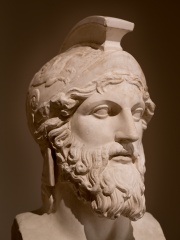
5. Miltiades (540 BC - 488 BC)
With an HPI of 80.08, Miltiades is the 5th most famous Greek Military Personnel. His biography has been translated into 47 different languages.
Miltiades (; Ancient Greek: Μιλτιάδης Κίμωνος; c. 550 – 489 BC), also known as Miltiades the Younger, was a Greek Athenian statesman known mostly for his role in the Battle of Marathon, as well as for his downfall afterwards. He was the son of Cimon Coalemos, a renowned Olympic chariot-racer, and the father of Cimon, the noted Athenian statesman.

6. Pyrrhus of Epirus (318 BC - 272 BC)
With an HPI of 79.22, Pyrrhus of Epirus is the 6th most famous Greek Military Personnel. His biography has been translated into 75 different languages.
Pyrrhus ( PIRR-əss; Ancient Greek: Πύρρος Pýrrhos; 319/318–272 BC) was a Greek king and statesman of the Hellenistic period. He was king of the Molossians, of the royal Aeacid house, and later he became king (Malalas also called him toparch) of Epirus. He was one of the strongest opponents of early Rome, and had been regarded as one of the greatest generals of antiquity. Several of his victorious battles caused him unacceptably heavy losses, from which the phrase "Pyrrhic victory" was coined. Pyrrhus became king of Epirus in 306 BC at the age of 13, but was dethroned by Cassander four years later. He saw action during the Wars of the Diadochi and regained his throne in 297 BC with the support of Ptolemy I Soter. He co-ruled Macedon together with Lysimachus after driving out Demetrius in 288 BC. In 284 BC, he was driven out of Macedon by Lysimachus. During the eponymous Pyrrhic War of 280–275 BC, Pyrrhus fought Rome at the behest of Tarentum, scoring costly victories at Heraclea and Asculum. He proceeded to take over Sicily from Carthage, but after some initial success, he was soon driven out and returned to Italy where he lost all his gains after the Battle of Beneventum in 275 BC. Pyrrhus seized the Macedonian throne from Antigonus II Gonatas in 274 BC and invaded the Peloponnese in 272 BC. The Epirote assault on Sparta was thwarted, however, and Pyrrhus was killed during a street battle at Argos.

7. Seleucus I Nicator (358 BC - 281 BC)
With an HPI of 77.87, Seleucus I Nicator is the 7th most famous Greek Military Personnel. His biography has been translated into 73 different languages.
Seleucus I Nicator (; Greek: Σέλευκος Νικάτωρ, Séleukos Nikátōr, "Seleucus the Victorious"; c. 358 BC – 281 BC) was a Macedonian Greek general, officer and successor of Alexander the Great who went on to found the eponymous Seleucid Empire, led by the Seleucid dynasty. Initially a secondary player in the power struggles following Alexander's death, Seleucus rose to become the total ruler of Asia Minor, Syria, Mesopotamia, and the Iranian plateau, assuming the title of basileus (king). The Seleucid Empire was one of the major powers of the Hellenistic world, until it was overcome by the Roman Republic and Parthian Empire in the late second and early first centuries BC. While serving under Alexander, Seleucus was commander of the Hypaspistai, an elite Macedonian infantry unit. After the death of Alexander in June 323 BC, Seleucus initially supported Perdiccas, the regent of Alexander's empire, and was appointed Commander of the Companions and chiliarch at the Partition of Babylon in 323 BC. However, after the outbreak of the Wars of the Diadochi in 322, Perdiccas' military failures against Ptolemy in Egypt led to the mutiny of his troops in Pelusium. Perdiccas was betrayed and assassinated in a conspiracy by Seleucus, Peithon and Antigenes in Pelusium sometime in either 321 or 320 BC. At the Partition of Triparadisus in 321 BC, Seleucus was appointed Satrap of Babylon under the new regent Antipater. But almost immediately, the wars between the Diadochi resumed and one of the most powerful of the Diadochi, Antigonus, forced Seleucus to flee Babylon. Seleucus was only able to return to Babylon in 312 BC with the support of Ptolemy. From 312 BC, Seleucus ruthlessly expanded his dominions and eventually conquered the Persian and Median lands. Seleucus ruled not only Babylonia, but the entire eastern part of Alexander's empire. Seleucus further made claim to the former satrapies in Gandhara and in northwest India. However these ambitions were contested by Chandragupta Maurya, resulting in the Seleucid–Mauryan War (305–303 BC). The conflict was ultimately resolved by a treaty resulting in the Maurya Empire annexing the eastern satrapies. Additionally, a marriage alliance was formed, with Chandragupta marrying a daughter of Seleucus, according to Strabo and Appian. Furthermore, the Seleucid Empire received a considerable military force of 500 war elephants with mahouts, which would play a decisive role against Antigonus at the Battle of Ipsus in 301 BC. In 281 BC, he also defeated Lysimachus at the Battle of Corupedium, adding Asia Minor to his empire. Seleucus' victories against Antigonus and Lysimachus left the Seleucid dynasty virtually unopposed amongst the Diadochi. However, Seleucus also hoped to take control of Lysimachus' European territories, primarily Thrace and Macedon itself. But upon arriving in Thrace in 281 BC, Seleucus was assassinated by Ptolemy Ceraunus, who had taken refuge at the Seleucid court with his sister Lysandra. The assassination of Seleucus destroyed Seleucid prospects in Thrace and Macedon, and paved the way for Ptolemy Ceraunus to absorb much of Lysimachus' former power in Macedon. Seleucus was succeeded by his son Antiochus I as ruler of the Seleucid Empire. Seleucus founded a number of new cities during his reign, including Antioch (300 BC), Edessa and Seleucia on the Tigris (c. 305 BC), a foundation that eventually depopulated Babylon.

8. Mardonius (600 BC - 479 BC)
With an HPI of 75.10, Mardonius is the 8th most famous Greek Military Personnel. His biography has been translated into 35 different languages.
Mardonius (Old Persian: 𐎶𐎼𐎯𐎢𐎴𐎡𐎹 Mr̥duniyaʰ; Ancient Greek: Μαρδόνιος Mardónios; died 479 BC) was a Persian military commander during the Greco-Persian Wars. Though he secured initial victories in the first Persian invasion of Greece, he was ultimately forced to retreat into Anatolia after suffering catastrophic losses in both men and material due to a storm off the coast of Mount Athos, following which he was relieved of his command by Darius the Great. He was later re-appointed by Xerxes I and took part in the second Persian invasion of Greece. In 480 and 479 BC, Mardonius spearheaded the Persian army's destruction of Athens. Shortly thereafter, he was killed during the Battle of Plataea.

9. Hephaestion (356 BC - 324 BC)
With an HPI of 74.80, Hephaestion is the 9th most famous Greek Military Personnel. His biography has been translated into 40 different languages.
Hephaestion (Ancient Greek: Ἡφαιστίων Hēphaistíōn; c. 356 BC – 324 BC), son of Amyntor, was an ancient Macedonian nobleman of probable "Attic or Ionian extraction" and a general in the army of Alexander the Great. He was "by far the dearest of all the king's friends; he had been brought up with Alexander and shared all his secrets." This relationship lasted throughout their lives, and was compared, by others as well as themselves, to that of Achilles and Patroclus. His military career was distinguished. A member of Alexander the Great's personal bodyguard, he went on to command the Companion cavalry and was entrusted with many other tasks throughout Alexander's ten-year campaign in Asia, including diplomatic missions, the bridging of major rivers, sieges and the foundation of new settlements. Besides being a soldier, engineer and diplomat, he corresponded with the philosophers Aristotle and Xenocrates and actively supported Alexander in his attempts to integrate the Greeks and Persians. Alexander formally made him his second-in-command when he appointed him Chiliarch of the empire. Alexander also made him part of the royal family when he gave him as his bride Drypetis, sister to his own second wife Stateira, both daughters of Darius III of Persia. When Hephaestion died suddenly at Ecbatana around age thirty-two, Alexander was overwhelmed with grief. He petitioned the oracle at Siwa to grant Hephaestion divine status and thus Hephaestion was honoured as a Divine Hero. Hephaestion was cremated and his ashes taken to Babylon. At the time of his own death a mere eight months later, Alexander was still planning lasting monuments to Hephaestion's memory.
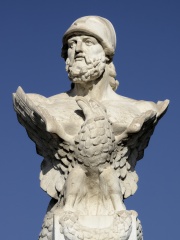
10. Cimon (510 BC - 450 BC)
With an HPI of 74.15, Cimon is the 10th most famous Greek Military Personnel. His biography has been translated into 41 different languages.
Cimon or Kimon (Ancient Greek: Κίμων, romanized: Kimōn; c. 510 – 450 BC) was an Athenian strategos (general and admiral) and politician. He was the son of Miltiades, also an Athenian strategos. Cimon rose to prominence for his bravery fighting in the naval Battle of Salamis (480 BC), during the Second Persian invasion of Greece. Cimon was then elected as one of the ten strategoi, to continue the Persian Wars against the Achaemenid Empire. He played a leading role in the formation of the Delian League against Persia in 478 BC, becoming its commander in the early Wars of the Delian League, including at the Siege of Eion (476 BC). In 466 BC, Cimon led a force to Asia Minor, where he destroyed a Persian fleet and army at the Battle of the Eurymedon river. From 465 to 463 BC he suppressed the Thasian rebellion, in which the island of Thasos attempted to leave the Delian League. This event marked the transformation of the Delian League into the Athenian Empire. Cimon took an increasingly prominent role in Athenian politics, generally supporting the aristocrats and opposing the popular party (which sought to expand the Athenian democracy). A laconist, Cimon also acted as Sparta's representative in Athens. In 462 BC, he convinced the Athenian Assembly to send military support to Sparta, where the helots were in revolt (the Third Messenian War). Cimon personally commanded the force of 4,000 hoplites sent to Sparta. However, the Spartans refused their aid, telling the Athenians to go home – a major diplomatic snub. The resulting embarrassment destroyed Cimon's popularity in Athens; he was ostracized in 461 BC, exiling him for a period of ten years. The First Peloponnesian War between Athens and Sparta began the following year. At the end of his exile, Cimon returned to Athens in 451 BC and immediately negotiated a truce with Sparta; however it did not lead to a permanent peace. He then proposed an expedition to Cyprus, which was in revolt against the Persians. Cimon was placed in command of the fleet of 200 warships. He laid siege to the town of Kition, but died (of unrecorded causes) around the time of the failure of the siege in 450 BC.
People
Pantheon has 56 people classified as Greek military personnels born between 650 BC and 1923. Of these 56, none of them are still alive today. The most famous deceased Greek military personnels include Alexander the Great, Spartacus, and Themistocles.
Deceased Greek Military Personnels
Go to all RankingsAlexander the Great
356 BC - 323 BC
HPI: 95.63
Spartacus
109 BC - 71 BC
HPI: 82.09
Themistocles
524 BC - 459 BC
HPI: 80.86
Ptolemy I Soter
367 BC - 283 BC
HPI: 80.86
Miltiades
540 BC - 488 BC
HPI: 80.08
Pyrrhus of Epirus
318 BC - 272 BC
HPI: 79.22
Seleucus I Nicator
358 BC - 281 BC
HPI: 77.87
Mardonius
600 BC - 479 BC
HPI: 75.10
Hephaestion
356 BC - 324 BC
HPI: 74.80
Cimon
510 BC - 450 BC
HPI: 74.15
Pittacus of Mytilene
650 BC - 570 BC
HPI: 72.77
Desmond Doss
1919 - 2006
HPI: 72.42
Overlapping Lives
Which Military Personnels were alive at the same time? This visualization shows the lifespans of the 16 most globally memorable Military Personnels since 1700.

